中考定语从句课件(共37张PPT)
图片预览
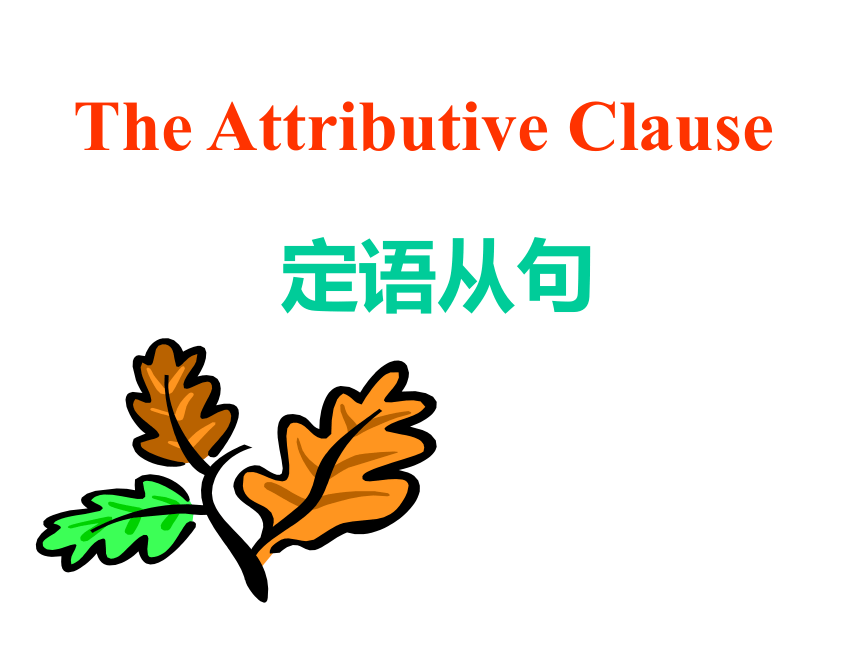
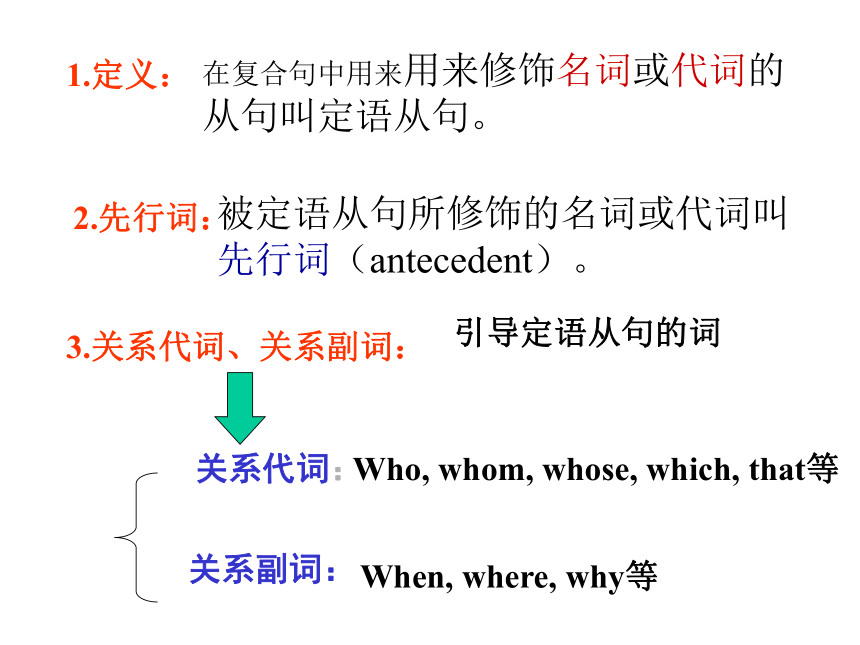
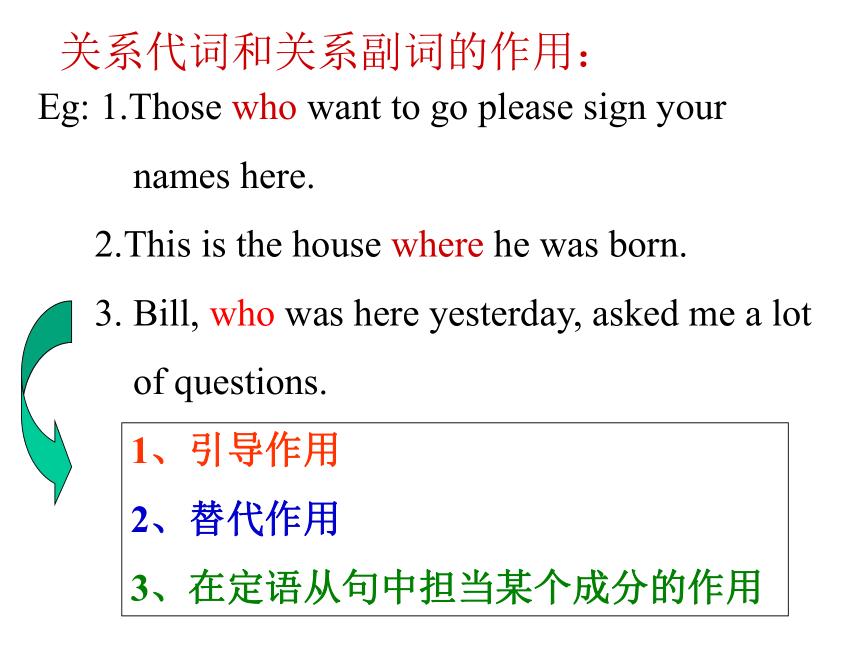
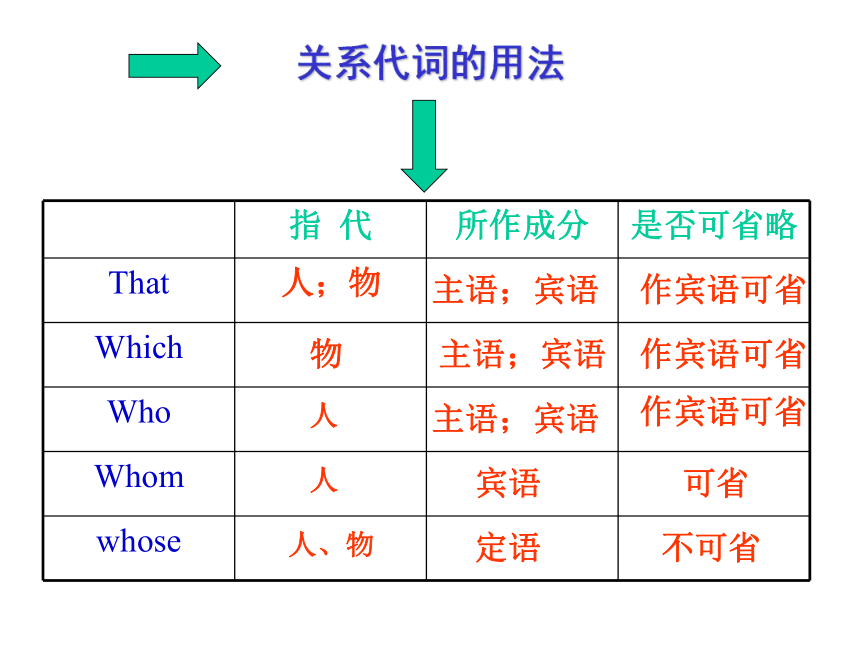
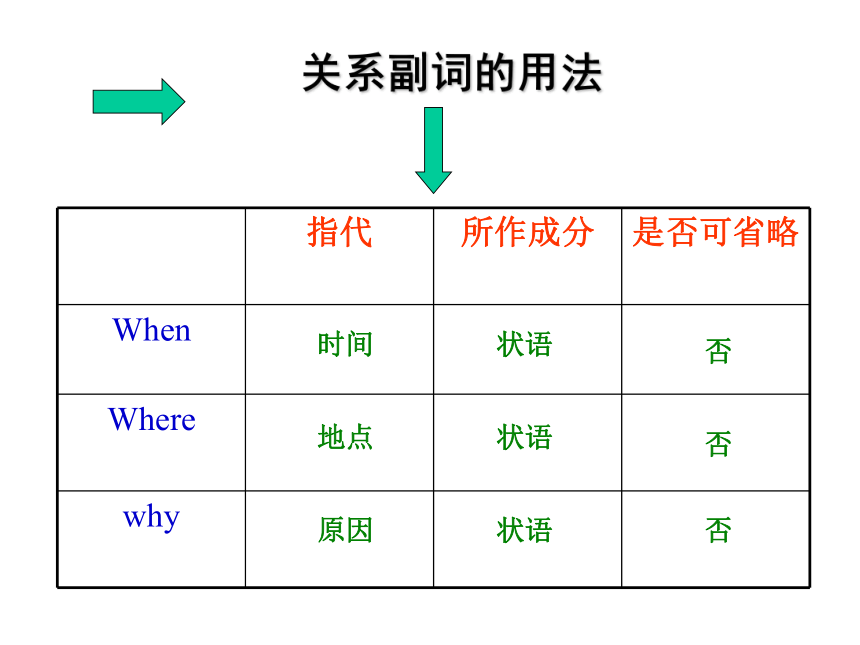
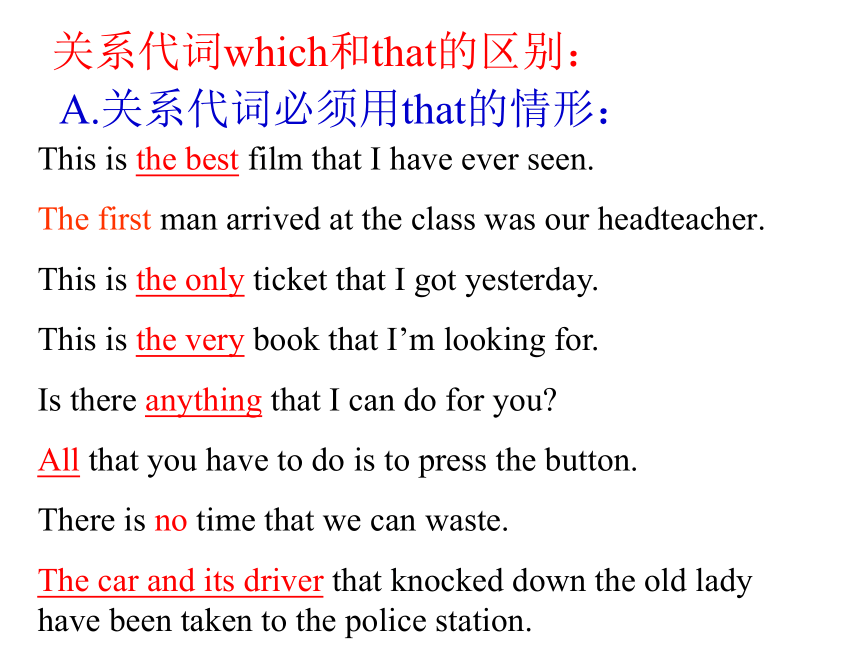
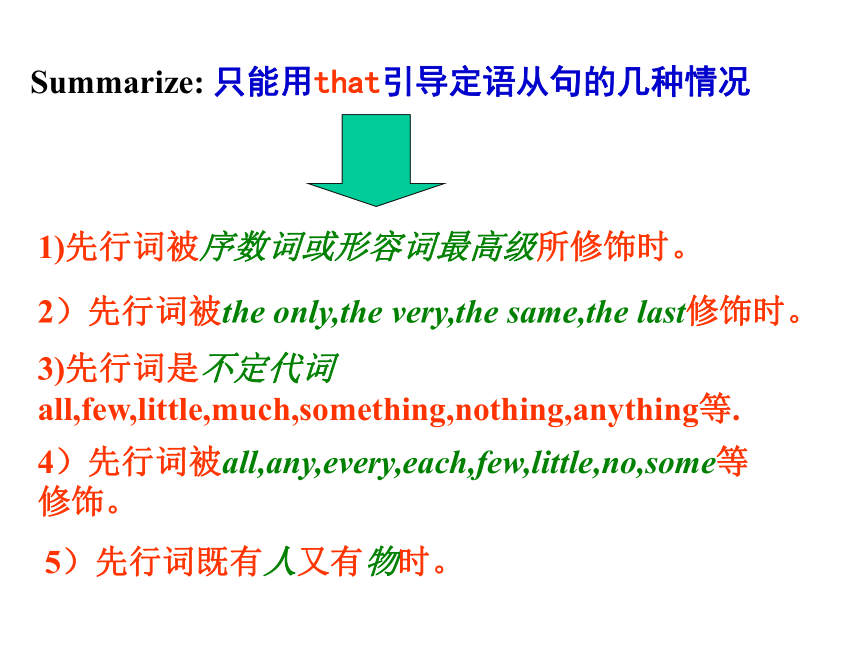
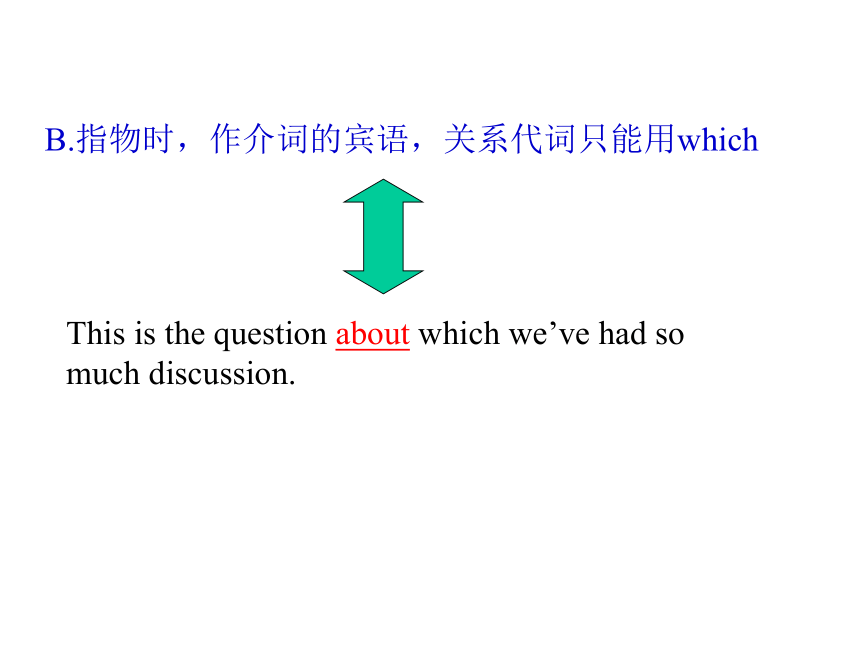
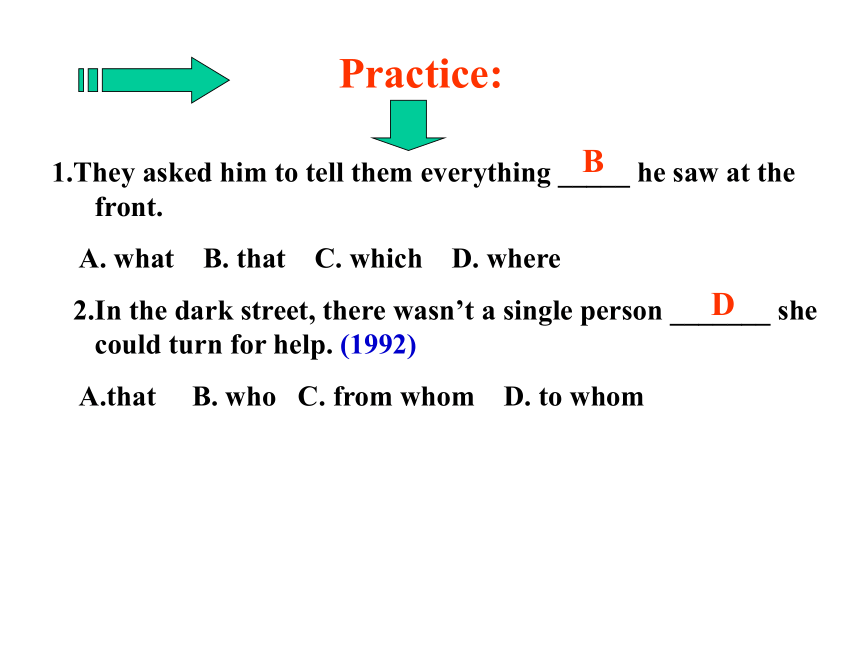
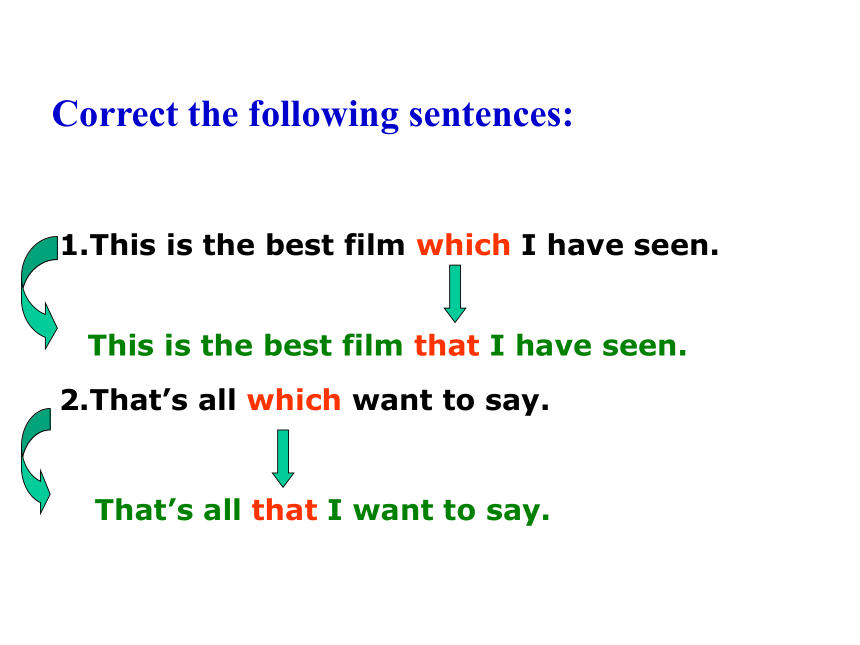
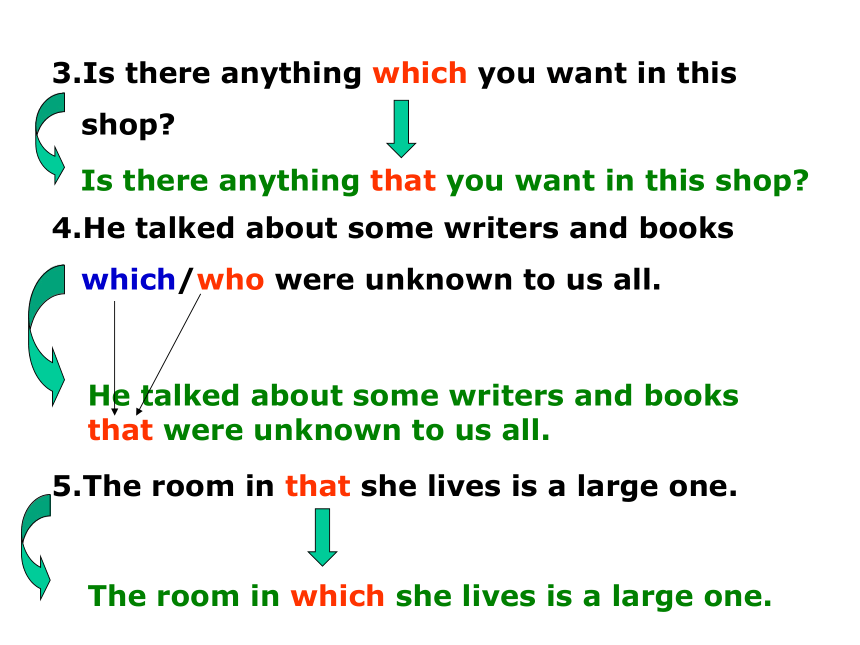

文档简介
(共37张PPT)
The Attributive Clause
定语从句
1.定义:
2.先行词:
3.关系代词、关系副词:
在复合句中用来用来修饰名词或代词的从句叫定语从句。
被定语从句所修饰的名词或代词叫先行词(antecedent)。
引导定语从句的词
关系代词:
关系副词:
Who, whom, whose, which, that等
When, where, why等
关系代词和关系副词的作用:
1、引导作用
2、替代作用
3、在定语从句中担当某个成分的作用
Eg: 1.Those who want to go please sign your
names here.
2.This is the house where he was born.
3. Bill, who was here yesterday, asked me a lot
of questions.
关系代词的用法
指 代 所作成分 是否可省略
That
Which
Who
Whom
whose
人;物
物
人
人
人、物
主语;宾语
主语;宾语
主语;宾语
宾语
定语
作宾语可省
作宾语可省
作宾语可省
可省
不可省
关系副词的用法
指代 所作成分 是否可省略
When
Where
why
时间
状语
否
地点
状语
否
原因
状语
否
关系代词which和that的区别:
A.关系代词必须用that的情形:
This is the best film that I have ever seen.
The first man arrived at the class was our headteacher.
This is the only ticket that I got yesterday.
This is the very book that I’m looking for.
Is there anything that I can do for you
All that you have to do is to press the button.
There is no time that we can waste.
The car and its driver that knocked down the old lady have been taken to the police station.
Summarize: 只能用that引导定语从句的几种情况
1)先行词被序数词或形容词最高级所修饰时。
2)先行词被the only,the very,the same,the last修饰时。
3)先行词是不定代词all,few,little,much,something,nothing,anything等.
4)先行词被all,any,every,each,few,little,no,some等修饰。
5)先行词既有人又有物时。
B.指物时,作介词的宾语,关系代词只能用which
This is the question about which we’ve had so much discussion.
Practice:
1.They asked him to tell them everything _____ he saw at the front.
A. what B. that C. which D. where
2.In the dark street, there wasn’t a single person _______ she could turn for help. (1992)
A.that B. who C. from whom D. to whom
B
D
Correct the following sentences:
1.This is the best film which I have seen.
2.That’s all which want to say.
This is the best film that I have seen.
That’s all that I want to say.
3.Is there anything which you want in this
shop
4.He talked about some writers and books
which/who were unknown to us all.
5.The room in that she lives is a large one.
Is there anything that you want in this shop
He talked about some writers and books that were unknown to us all.
The room in which she lives is a large one.
关系副词when, where, why的用法
1.Do you still remember the day whenwe went to visit
the museum together
Do you still remember the day on whichwe went to visit the museum together
2.This is the factory wheremy father once worked.
This is the factory in whichmy father once worked.
3.This is the reason whyhe was late.
This is the reason for which he was late.
Summarize:
在定语从句中关系副词都等于一个适当的介词加上which,在从句中作状语
When=in/at/on/…+which;
Where=in/at/on/…+which;
Why=for /…+which
Practice:
1.---- I drove to Zhuhai for the air show last week. (1999)
--- Is that the reason_______ you had a few days off
A.why B. when C. what D. where
2.I’m going to visit the school _________ my mother taught physics ten years ago.
A.where B. that C. which D. what
3.Do you still remember the day ___________ I first came to Beijing
A. which B. that C. when D. where
A
A
C
主动表示被动:
某些感官动词和系动词加形容词可以表示被动意义,如look, smell, taste, feel, prove, wear, sound等
The flower smells sweet.
The dish tastes delicious.
The cloth feels very soft.
The stones have worn smooth.
2. 某些及物动词后加副词(有些可不加副词)表示事物固有的属性或特征,也可以表示被动意义,如wash, write, sell, read, open, cut, lock, peel, pack, play, shut, spot, split, strike, record, act, clean, draw, iron, keep, photograph等
This type of recorder sells well.
That kind of shirt washes very well.
Ripe apples peel easily.
The plays won’t act.
Nylon dries quickly.
6) The novel reads well.
7) The door opens with difficulty.
8) The wood won’t burn.
9) Water heats rapidly.
10) This kind of shirt cleans easily.
11) Her coat caught in the door/ on the nail.
比较:
1. The box doesn’t lock.
这个箱子锁不上。 (箱子本身的性质)
2. The box was not locked.
这个箱子没有上锁。(箱子当时的状态)
3. The theory proved to be correct.
那个理论证明是正确的。(含有自身证明的特征)
4. The theory was proved to be correct.
那个理论被证明是正确的。(被人证明)
3. want, need, require,和be worth等词的后面可以用动名词的主动形式表示被动意义。
The book is worth reading.
The coat requires mending.
The children needs looking after.
The table wants cleaning.
某些作表语(expensive, cheap, difficult, fit, hard, light, heavy, easy, 的形容词后,用不定式形式表示被动意义。
The box is too heavy to lift.
She is easy to approach.
The fish is not fit to eat.
He is hard to please.
The passage is difficult to read.
The jewel is too expensive to buy.
There are a lot of work to do/ to be done.
There are a lot of work for us to do.
The Passive Voice
被动语态
了解被动语态
被动语态构成:be+P.P
2、形式:
1) 一般现在时:am/is/are+P.P
1.英语中有两种语态,主动语态和被动语态
2) 一般过去时:was/were+P.P
3) 情态动词+be+P.P
4) 一般将来时:will +be +p.p
5) 现在完成时:have/has+been+P.P
6) 现在进行时态:is/am/are+being+P.P
1.Bananas are grown in Hainan.(海南种植香焦。)
2.Many more trees will be planted in our school next year.(我们学校明年将种更多的树。)
3.Were the trees planted by him.这些树是他种的吗?
4.Young trees must be looked after.
(必须照看好小树)
5. The building is being built.
(那栋楼房正在建设中。)
6.The homework has been finished yet.
(家作已经做完了。)
1.He teaches English in our school.
English is taught in our school by him.
语态转换
宾提前变主,主变介by宾,被动be加done,时态看主动
2.We planted many trees last years.
Many trees were planted by us last year.
过去时的被动语态:
was/were+P.P
3.We should plant many more trees.
Many more trees should be planted by us.
含情态动词的被动语态:
情态动词+be +PP
4.She will teach Class 6.
Class 6 will be taught by her.
将来时的被动语态:
Will/shall+be +PP
5. Many countries have sent up satellites
into space.
Satellites have been sent up into space
by many countries .
完成时的被动语:
Have/has+been +PP
现在进行时的被动语态:
is+being+pp
6.She is teaching Class 6.
Class 6 is being taught by her.
I was given a book by her.
A book was given to me by her.
7.She gave me a book.
如 遇双宾语,最好变间宾,如若变直宾,间宾前to/for(pass,lend,buy,write,bring, show,tell…)
8.He made me do the work.
I was made to do the work by him.
这些动词真奇怪,主动句中to 离开,被动句中to回 来。(feel,listen to,hear,let have,make,look at,see,watch…)
9.They take good care of the baby.
The baby is taken good care of by them.
注意:含动词词组的被动语态,须将其看作一个
整体,不可把它们分隔开来。
A traffic accident ________(happen) just now.
happened
2. 连系动词(Link.v.) 如:be, look, seem, feel, sound, smell, taste, get, turn, become…
Peking Opera ________ (sound) beautiful.
sounds
3. 当此动词表示事物的自然属性的时候:
The pen _________ (write) very fast.
writes
This kind of sweater _______ (sell) well.
sells
1. 不及物动词(vi.) 如:happen, take place, appear, disappear, …
不用被动语态的动词:
1. Large numbers of plastic bags _________ (use) in the supermarkets every day.
2. _____ our country ____(send) up another man-made satellite last year
3. Must the old people ___________ (speak) to politely
4. Her grandma was still alive when he _________ (take) to the hospital.
5. English __________(speak) in many counties.
are used
Did
send
be spoken
was taken
is spoken
6. Three quarters of the world’s books ____________ (write) in English.
7. This kind of sweater __________ (sell) well.
8. _________ Lesson 50 ___________ (teach) next week
are written
sells
Will
be taught
Fill in the blanks using right forms:
1. All the students __________(ask) to bring a kite with them last Sunday.
2. Are many ways _______(try) to stop people from cutting down so many trees
3. —What are on show in the museum
—Some photos _________(take) by American children.
4.
This coat _________(wash) well.
9. Have you found your necklace ________(偷) last week
6. I’m often _________(警告)not to copy others’ homework.
7. He couldn’t explain why dinosaurs ___________ (消失).
8. I’ll have my bike __________________(修理) tomorrow.
5. Must the old people ____________(speak) to politely
10. The PRC was _________(成立) on October 1, 1949.
were asked
tried
taken
washes
be spoken
warned
disappeared
mended/repaired
stolen
founded
The Attributive Clause
定语从句
1.定义:
2.先行词:
3.关系代词、关系副词:
在复合句中用来用来修饰名词或代词的从句叫定语从句。
被定语从句所修饰的名词或代词叫先行词(antecedent)。
引导定语从句的词
关系代词:
关系副词:
Who, whom, whose, which, that等
When, where, why等
关系代词和关系副词的作用:
1、引导作用
2、替代作用
3、在定语从句中担当某个成分的作用
Eg: 1.Those who want to go please sign your
names here.
2.This is the house where he was born.
3. Bill, who was here yesterday, asked me a lot
of questions.
关系代词的用法
指 代 所作成分 是否可省略
That
Which
Who
Whom
whose
人;物
物
人
人
人、物
主语;宾语
主语;宾语
主语;宾语
宾语
定语
作宾语可省
作宾语可省
作宾语可省
可省
不可省
关系副词的用法
指代 所作成分 是否可省略
When
Where
why
时间
状语
否
地点
状语
否
原因
状语
否
关系代词which和that的区别:
A.关系代词必须用that的情形:
This is the best film that I have ever seen.
The first man arrived at the class was our headteacher.
This is the only ticket that I got yesterday.
This is the very book that I’m looking for.
Is there anything that I can do for you
All that you have to do is to press the button.
There is no time that we can waste.
The car and its driver that knocked down the old lady have been taken to the police station.
Summarize: 只能用that引导定语从句的几种情况
1)先行词被序数词或形容词最高级所修饰时。
2)先行词被the only,the very,the same,the last修饰时。
3)先行词是不定代词all,few,little,much,something,nothing,anything等.
4)先行词被all,any,every,each,few,little,no,some等修饰。
5)先行词既有人又有物时。
B.指物时,作介词的宾语,关系代词只能用which
This is the question about which we’ve had so much discussion.
Practice:
1.They asked him to tell them everything _____ he saw at the front.
A. what B. that C. which D. where
2.In the dark street, there wasn’t a single person _______ she could turn for help. (1992)
A.that B. who C. from whom D. to whom
B
D
Correct the following sentences:
1.This is the best film which I have seen.
2.That’s all which want to say.
This is the best film that I have seen.
That’s all that I want to say.
3.Is there anything which you want in this
shop
4.He talked about some writers and books
which/who were unknown to us all.
5.The room in that she lives is a large one.
Is there anything that you want in this shop
He talked about some writers and books that were unknown to us all.
The room in which she lives is a large one.
关系副词when, where, why的用法
1.Do you still remember the day whenwe went to visit
the museum together
Do you still remember the day on whichwe went to visit the museum together
2.This is the factory wheremy father once worked.
This is the factory in whichmy father once worked.
3.This is the reason whyhe was late.
This is the reason for which he was late.
Summarize:
在定语从句中关系副词都等于一个适当的介词加上which,在从句中作状语
When=in/at/on/…+which;
Where=in/at/on/…+which;
Why=for /…+which
Practice:
1.---- I drove to Zhuhai for the air show last week. (1999)
--- Is that the reason_______ you had a few days off
A.why B. when C. what D. where
2.I’m going to visit the school _________ my mother taught physics ten years ago.
A.where B. that C. which D. what
3.Do you still remember the day ___________ I first came to Beijing
A. which B. that C. when D. where
A
A
C
主动表示被动:
某些感官动词和系动词加形容词可以表示被动意义,如look, smell, taste, feel, prove, wear, sound等
The flower smells sweet.
The dish tastes delicious.
The cloth feels very soft.
The stones have worn smooth.
2. 某些及物动词后加副词(有些可不加副词)表示事物固有的属性或特征,也可以表示被动意义,如wash, write, sell, read, open, cut, lock, peel, pack, play, shut, spot, split, strike, record, act, clean, draw, iron, keep, photograph等
This type of recorder sells well.
That kind of shirt washes very well.
Ripe apples peel easily.
The plays won’t act.
Nylon dries quickly.
6) The novel reads well.
7) The door opens with difficulty.
8) The wood won’t burn.
9) Water heats rapidly.
10) This kind of shirt cleans easily.
11) Her coat caught in the door/ on the nail.
比较:
1. The box doesn’t lock.
这个箱子锁不上。 (箱子本身的性质)
2. The box was not locked.
这个箱子没有上锁。(箱子当时的状态)
3. The theory proved to be correct.
那个理论证明是正确的。(含有自身证明的特征)
4. The theory was proved to be correct.
那个理论被证明是正确的。(被人证明)
3. want, need, require,和be worth等词的后面可以用动名词的主动形式表示被动意义。
The book is worth reading.
The coat requires mending.
The children needs looking after.
The table wants cleaning.
某些作表语(expensive, cheap, difficult, fit, hard, light, heavy, easy, 的形容词后,用不定式形式表示被动意义。
The box is too heavy to lift.
She is easy to approach.
The fish is not fit to eat.
He is hard to please.
The passage is difficult to read.
The jewel is too expensive to buy.
There are a lot of work to do/ to be done.
There are a lot of work for us to do.
The Passive Voice
被动语态
了解被动语态
被动语态构成:be+P.P
2、形式:
1) 一般现在时:am/is/are+P.P
1.英语中有两种语态,主动语态和被动语态
2) 一般过去时:was/were+P.P
3) 情态动词+be+P.P
4) 一般将来时:will +be +p.p
5) 现在完成时:have/has+been+P.P
6) 现在进行时态:is/am/are+being+P.P
1.Bananas are grown in Hainan.(海南种植香焦。)
2.Many more trees will be planted in our school next year.(我们学校明年将种更多的树。)
3.Were the trees planted by him.这些树是他种的吗?
4.Young trees must be looked after.
(必须照看好小树)
5. The building is being built.
(那栋楼房正在建设中。)
6.The homework has been finished yet.
(家作已经做完了。)
1.He teaches English in our school.
English is taught in our school by him.
语态转换
宾提前变主,主变介by宾,被动be加done,时态看主动
2.We planted many trees last years.
Many trees were planted by us last year.
过去时的被动语态:
was/were+P.P
3.We should plant many more trees.
Many more trees should be planted by us.
含情态动词的被动语态:
情态动词+be +PP
4.She will teach Class 6.
Class 6 will be taught by her.
将来时的被动语态:
Will/shall+be +PP
5. Many countries have sent up satellites
into space.
Satellites have been sent up into space
by many countries .
完成时的被动语:
Have/has+been +PP
现在进行时的被动语态:
is+being+pp
6.She is teaching Class 6.
Class 6 is being taught by her.
I was given a book by her.
A book was given to me by her.
7.She gave me a book.
如 遇双宾语,最好变间宾,如若变直宾,间宾前to/for(pass,lend,buy,write,bring, show,tell…)
8.He made me do the work.
I was made to do the work by him.
这些动词真奇怪,主动句中to 离开,被动句中to回 来。(feel,listen to,hear,let have,make,look at,see,watch…)
9.They take good care of the baby.
The baby is taken good care of by them.
注意:含动词词组的被动语态,须将其看作一个
整体,不可把它们分隔开来。
A traffic accident ________(happen) just now.
happened
2. 连系动词(Link.v.) 如:be, look, seem, feel, sound, smell, taste, get, turn, become…
Peking Opera ________ (sound) beautiful.
sounds
3. 当此动词表示事物的自然属性的时候:
The pen _________ (write) very fast.
writes
This kind of sweater _______ (sell) well.
sells
1. 不及物动词(vi.) 如:happen, take place, appear, disappear, …
不用被动语态的动词:
1. Large numbers of plastic bags _________ (use) in the supermarkets every day.
2. _____ our country ____(send) up another man-made satellite last year
3. Must the old people ___________ (speak) to politely
4. Her grandma was still alive when he _________ (take) to the hospital.
5. English __________(speak) in many counties.
are used
Did
send
be spoken
was taken
is spoken
6. Three quarters of the world’s books ____________ (write) in English.
7. This kind of sweater __________ (sell) well.
8. _________ Lesson 50 ___________ (teach) next week
are written
sells
Will
be taught
Fill in the blanks using right forms:
1. All the students __________(ask) to bring a kite with them last Sunday.
2. Are many ways _______(try) to stop people from cutting down so many trees
3. —What are on show in the museum
—Some photos _________(take) by American children.
4.
This coat _________(wash) well.
9. Have you found your necklace ________(偷) last week
6. I’m often _________(警告)not to copy others’ homework.
7. He couldn’t explain why dinosaurs ___________ (消失).
8. I’ll have my bike __________________(修理) tomorrow.
5. Must the old people ____________(speak) to politely
10. The PRC was _________(成立) on October 1, 1949.
were asked
tried
taken
washes
be spoken
warned
disappeared
mended/repaired
stolen
founded
同课章节目录
- 词法
- 名词
- 动词和动词短语
- 动词语态
- 动词时态
- 助动词和情态动词
- 非谓语动词
- 冠词
- 代词
- 数词和量词
- 形容词副词及其比较等级
- 介词和介词短语
- 连词和感叹词
- 构词法
- 相似、相近词比较
- 句法
- 陈述句
- 一般疑问句和否定疑问句
- 特殊疑问句及选择疑问句
- 反意疑问句
- 存在句(There be句型)
- 宾语从句
- 定语从句
- 状语从句
- 主谓一致问题
- 简单句
- 并列句
- 复合句
- 主谓一致
- 主、表语从句
- 名词性从句
- 直接引语和间接引语
- 虚拟语气
- 感叹句
- 强调句
- 倒装句
- 祈使句
- 句子的成分
- 句子的分类
- 题型专区
- 单项选择部分
- 易错题
- 完形填空
- 阅读理解
- 词汇练习
- 听说训练
- 句型转换
- 补全对话
- 短文改错
- 翻译
- 书面表达
- 任务型阅读
- 语法填空
- 其他资料
